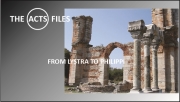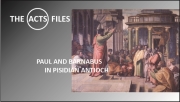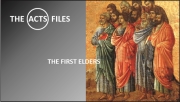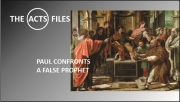 Acts 16.11 shows us how Paul entered Europe for the first time, through Neapolis to Philippi. The traveling apostle had been through much of the near and middle east, the Province of Asia, but never before set foot on European soil. He was a long way from home, but continued to stick to tried and true methods of evangelism. After all, people are people no matter the country from which they hail.
Acts 16.11 shows us how Paul entered Europe for the first time, through Neapolis to Philippi. The traveling apostle had been through much of the near and middle east, the Province of Asia, but never before set foot on European soil. He was a long way from home, but continued to stick to tried and true methods of evangelism. After all, people are people no matter the country from which they hail.
 Speaking of division, at the end of chapter 15 we see a divide grow between the apostles Paul and Barnabas. The timing of their dispute should not be overlooked. They had just returned from Jerusalem where they were able to debate and amicably defend the gospel and Christian doctrine to everyone’s satisfaction, yet they can’t work out a personal disagreement.
Speaking of division, at the end of chapter 15 we see a divide grow between the apostles Paul and Barnabas. The timing of their dispute should not be overlooked. They had just returned from Jerusalem where they were able to debate and amicably defend the gospel and Christian doctrine to everyone’s satisfaction, yet they can’t work out a personal disagreement.
 After establishing a community of believers in Derbe, Paul and Barnabas had to decide the next leg of their journey. Surely they discussed the possibility of heading south to Tarsus and catching a ship back to Antioch in Syria. After having been stoned and left for dead, however, Paul likely worried about the fate of those churches they had established in Lystra, Iconium and Pisidian Antioch. They made the hard choice of retracing their steps to assure their brothers and sisters were well and to bring them the encouragement they surely needed.
After establishing a community of believers in Derbe, Paul and Barnabas had to decide the next leg of their journey. Surely they discussed the possibility of heading south to Tarsus and catching a ship back to Antioch in Syria. After having been stoned and left for dead, however, Paul likely worried about the fate of those churches they had established in Lystra, Iconium and Pisidian Antioch. They made the hard choice of retracing their steps to assure their brothers and sisters were well and to bring them the encouragement they surely needed.
![]() After being chased from the city of Antioch in Pisidia, Paul and Barnabas fled to Iconium and followed their pattern of first visiting the Jewish synagogue of the city. There they met with similar results as in Pisidian Antioch, with one important difference.
After being chased from the city of Antioch in Pisidia, Paul and Barnabas fled to Iconium and followed their pattern of first visiting the Jewish synagogue of the city. There they met with similar results as in Pisidian Antioch, with one important difference.
 We find Paul, Silas and now Timothy setting out to continue this second missionary journey (Acts 16.6-.10). They set out from Lystra and traveled through Iconium and Pisidian-Antioch and continued west wanting to take the message of the Messiah to the Province of Asia. The Province of Asia is now mostly modern day Turkey and nowhere near the current continent of Asia (which is east of their present position). In doing so they ran into the first of two road blocks.
We find Paul, Silas and now Timothy setting out to continue this second missionary journey (Acts 16.6-.10). They set out from Lystra and traveled through Iconium and Pisidian-Antioch and continued west wanting to take the message of the Messiah to the Province of Asia. The Province of Asia is now mostly modern day Turkey and nowhere near the current continent of Asia (which is east of their present position). In doing so they ran into the first of two road blocks.
 It is appropriate after a discussion of the office of elder to turn to the first false teaching that threatened the early believers. In Acts 15 we see not only the false teaching, but how the church handled it. There is much for us to learn from this remarkable event, which begins with some Pharisees -- who believe Jesus is the Messiah -- coming to Antioch and adding to the gospel of grace.
It is appropriate after a discussion of the office of elder to turn to the first false teaching that threatened the early believers. In Acts 15 we see not only the false teaching, but how the church handled it. There is much for us to learn from this remarkable event, which begins with some Pharisees -- who believe Jesus is the Messiah -- coming to Antioch and adding to the gospel of grace.
 When the crowds witnessed Paul healing the lame man (Acts 14.10), they immediately assumed Paul and Barnabas were the Greek/Roman gods Zeus and Hermes. Someone immediately ran to the temple of Zeus just outside the city and told him everything that had happened. The temple priest prepared sacrifices and gifts for the two “gods” and brought them to the city so they could honor their gods.
When the crowds witnessed Paul healing the lame man (Acts 14.10), they immediately assumed Paul and Barnabas were the Greek/Roman gods Zeus and Hermes. Someone immediately ran to the temple of Zeus just outside the city and told him everything that had happened. The temple priest prepared sacrifices and gifts for the two “gods” and brought them to the city so they could honor their gods.
 Acts 13.4 begins Saul’s, soon to be called Paul for the rest of the book, first of three missionary journeys. Why the name change? As we saw yesterday with John Mark, it is not unusual in the New Testament era for people to go by two names, one Hebrew the other Greek. Paul is the Greek equivalent of Saul. He and Barnabas are accompanied by John Mark to the island of Cyprus.
Acts 13.4 begins Saul’s, soon to be called Paul for the rest of the book, first of three missionary journeys. Why the name change? As we saw yesterday with John Mark, it is not unusual in the New Testament era for people to go by two names, one Hebrew the other Greek. Paul is the Greek equivalent of Saul. He and Barnabas are accompanied by John Mark to the island of Cyprus.
 Speaking of division, at the end of chapter 15 we see a divide grow between the apostles Paul and Barnabas. The timing of their dispute should not be overlooked. They had just returned from Jerusalem where they were able to debate and amicably defend the gospel and Christian doctrine to everyone’s satisfaction, yet they can’t work out a personal disagreement.
Speaking of division, at the end of chapter 15 we see a divide grow between the apostles Paul and Barnabas. The timing of their dispute should not be overlooked. They had just returned from Jerusalem where they were able to debate and amicably defend the gospel and Christian doctrine to everyone’s satisfaction, yet they can’t work out a personal disagreement.
 Before continuing into chapter 15, we need to stop and look at a remarkable event that happened on Paul and Barnabas’ return journey. For the first time the term “elders” is used in church history.
Before continuing into chapter 15, we need to stop and look at a remarkable event that happened on Paul and Barnabas’ return journey. For the first time the term “elders” is used in church history.
 Running for their lives, in Acts 14.8 we catch up with Barnabas and Paul in Lystra. Rather than going underground and covertly escaping their pursuers, once in the city they continued in their usual manner and boldly proclaimed the good news of Jesus the Messiah.
Running for their lives, in Acts 14.8 we catch up with Barnabas and Paul in Lystra. Rather than going underground and covertly escaping their pursuers, once in the city they continued in their usual manner and boldly proclaimed the good news of Jesus the Messiah.
 Acts 13.4 begins Saul’s, soon to be called Paul for the rest of the book, first of three missionary journeys. Why the name change? As we saw yesterday with John Mark, it is not unusual in the New Testament era for people to go by two names, one Hebrew the other Greek. Paul is the Greek equivalent of Saul. He and Barnabas are accompanied by John Mark to the island of Cyprus.
Acts 13.4 begins Saul’s, soon to be called Paul for the rest of the book, first of three missionary journeys. Why the name change? As we saw yesterday with John Mark, it is not unusual in the New Testament era for people to go by two names, one Hebrew the other Greek. Paul is the Greek equivalent of Saul. He and Barnabas are accompanied by John Mark to the island of Cyprus.

